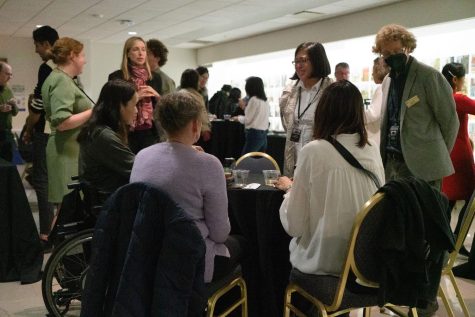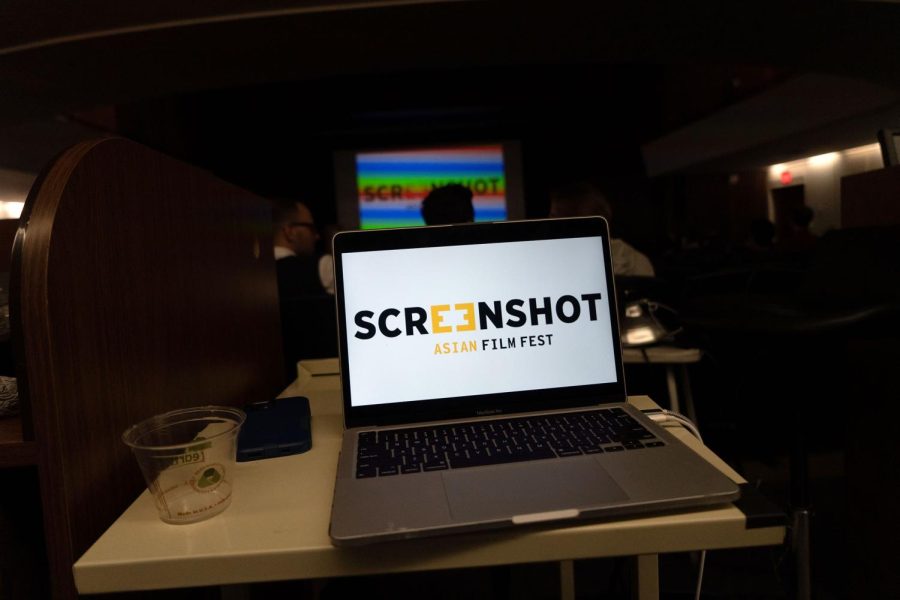Screenshot Asia film festival showcases Asian stories on screen
Jonathan Guo | Staff Photographer
A showing of Rehana Maryam Noor in the auditorium of Alumni Hall as part of the Screenshot Asia film festival on September 28, 2022.
September 29, 2022
For Kirsten Strayer, program coordinator of Screenshot Asia and co-chair of the organization’s film festival, the world is witnessing a new golden age of Asian filmmaking. She said the festival aims to bring that cinematic renaissance to Pittsburgh.
“Asian film is great right now. We’re seeing some of the best work in independent film coming out of Asia,” Strayer said. “Our goal is really to bring Asian film and Asian art to southwestern Pennsylvania and to share experiences that are highlighted in Asian film.”
Screenshot Asia is a project led by Pitt’s Asian Studies Center and Film and Media Studies program that highlights Asian culture through cinema. The festival, which takes place from Sept. 28 to Oct. 2, offers Pitt students free tickets to screenings of a collection of Asian films at Alumni Hall, the Frick Fine Arts Auditorium, the Tull Family Theater and the Harris Theater.
The festival features 11 films that the Screenshot Asia team curated to illustrate the cultural diversity of Asia. The films encompass the expanse of the continent, from the Indian subcontinent to the islands of Japan and the steppes of Kazakhstan. This year, the festival focuses on showcasing the experiences of Asian women. Many of the featured films depict women across Asia confronting sexism and misogyny in their personal and professional lives.

Strayer said it’s crucial that audiences see modern female protagonists on screen, especially within a media industry mostly dominated by men. Movies like “Happiness” exemplify that theme — the film tells the story of a Kazakh influencer who comes home to an abusive household, she said.
“It’s a fascinating struggle about women who consider themselves very powerful and part of a capitalist culture and want to succeed, but also live in this incredibly sexist legal infrastructure that doesn’t protect them,” Strayer said. “It’s about the struggle that a lot of women have between being their own person and dealing with the archaic infrastructure of marriage.”
Lynn Kawaratani, liaison librarian for architecture at Carnegie Mellon University and co-chair of the festival, said two of the festival’s films, “Marvelous and the Black Hole” and “Pushing Hands,” were personally significant to her.
“Both focus on the intergenerational complexities of family relationships and navigating life after tragedy,” Kawaratani said. “As an Asian American who has experienced death in the family, I can deeply relate to the challenging task of trying to continue living after such a profound loss.”
Madison Pleins, a junior film and media studies major who has worked as a Screenshot Asia intern for the past year, said she is most excited to see “Hit the Road,” an Iranian road trip drama centered on a high-spirited 6-year-old boy, at the festival.
“I have already had the opportunity to screen the film in the selection process for the festival, but it really stood out to me, and I am so glad that it is part of our programming this year,” Pleins said. “The cinematography is beautiful and the slight humor through the eyes of a child in the face of a rather heavy situation is very engaging.”
The first Screenshot Asia festival took place last year via a hybrid format. Audiences attended in-person screenings while those who wished to stay home streamed films online. Strayer said the virtual element of last year’s festival was vital for accessibility during the height of the COVID-19 pandemic, but nothing compares to the movie theater experience.
“There’s this viewing experience of having this communal relationship with the people you’re in the theater with — you’re shocked together, you’re excited together, you’re surprised together,” Strayer said. “It’s so different when you’re watching TV and the lights are on and your plant is sitting next to you. That’s not the same kind of pleasure you get when you go to a theater.”
Pleins said Asian film holds the power to break down international boundaries and enrich Pittsburgh’s cultural landscape.
“Film is a medium with the power to mirror, speak to and critique the real world. It is so important to see Asian stories on screen from Asian and Asian American storytellers,” Pleins said. “It has the power to change perspectives, to include people in the media, to combat harmful stereotypes and to teach others about culture through artistic expression. And to me that’s the goal of this festival — to create a space in the Pittsburgh area to celebrate Asian and Asian American culture through film.”
Kawaratani said Screenshot Asia’s mission is more relevant than ever.
“I believe the goal of the festival is to open eyes and open minds to the remarkable stories of Asia. Through a carefully curated selection of films, we are highlighting the geographic, genre and even expressive diversity of the Asian experience,” Kawaratani said. “In this time of such division, mistrust and anti-Asian hate, we need to embrace our common humanity again. Through the lens of film, we can begin to connect with those who seemed so foreign to us.”



